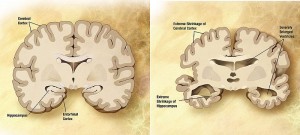While it is nearly common knowledge that probiotics give partial protection against certain colds, allergies, infectious diarrheas, and other health issues, scientists were not able to prove until recently that probiotics can potentially improve cognition. This is possible since there is communication between the gastrointestinal tract and the brain via the nervous system, the immune system, and hormones.
Scientists have seen that in mice, probiotics have caused an improvement in learning and memory. Researchers from Kashan University of Medical Sciences, Kashan, and Islamic Azad University, Tehran, Iran, completed a double-blind experiment where 52 men and women with Alzheimers (between 60 and 95 years old) either received milk enriched with four probiotic bacteria, or untreated milk. As predicted by several researchers, by the end of the 12 week period, those who received the milk with Lactobacillus acidophilus, L. casei, L. fermentum, and Bifidobacterium Bifidum displayed an improvement in cognition. To determine these results of the study, the scientists asked the participants of the study to complete tasks such as giving the current date, repeating a phrase, and counting backwards from 100 by sevens. Those who received the probiotics earned a “score” on these tasks ranging from 8.7 to 10.6 on the scale out of 30, whereas the participants who did not receive the probiotics scored slightly lower ranging from 8.5 to 8.0. Despite the seemingly minute difference, these results provide scientists with an insight as to the fact that probiotics can improve human cognition.
In the near future, scientists hope to test these results based on longevity of their intake to test whether or not the effects of probiotics grows throughout prolonged treatment. The patients who received the probiotics also demonstrated lower levels of triglyceride, Very Loy Density Lipoprotein (VLDL), high sensitivity C-Reactive protein (hs-CRP) in the blood of the Alzheimer patients, and a reduction in two common measures of insulin resistance and the activity of the insulin-producing cells in the pancreas. These results also signify that this change in metabolic adjustments might be a way that the probiotics impacts other cognitive and neurological disorders.
Further Reading:
http://www.medicalnewstoday.com/articles/314044.php
http://www.express.co.uk/life-style/health/731021/yoghurt-Alzheimers-symptoms-improve



Leave a Reply